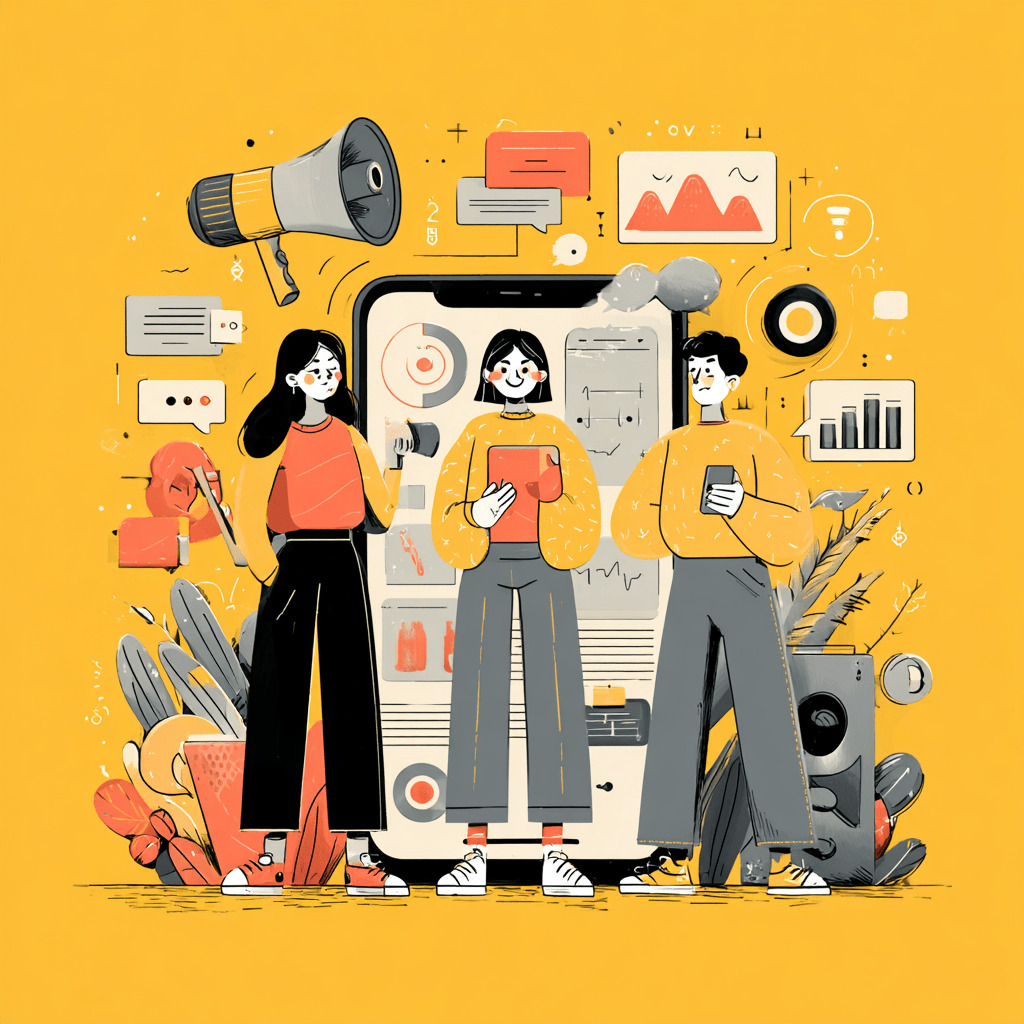
Top 10 marketing trends agencies can’t ignore in 2025
By Olly | 04 Jul 25
- Top 10 digital marketing trends for agencies in 2025
- 1. Artificial intelligence (AI) as a marketing powerhouse
- 2. The continued reign of short-form video
- 3. First-party data and data privacy imperative
- 4. The evolution of search: visual, voice & generative AI overviews
- 5. Authenticity and community through user-generated content (UGC)
- 6. The rise of social commerce
- 7. Hyper-personalization and customer experience (CX)
- 8. Influencer marketing's strategic niche focus
- 9. Purpose-driven marketing and brand values
- 10. Interactive content and immersive experiences (AR/VR)
- Staying ahead in 2025
The pace of change in marketing is relentless. In 2011, digital marketing outpaced traditional marketing for the first time, and now 90% of marketers are using traditional channels to reach their target audiences. Staying ahead and ensuring your marketing strategies remain effective means keeping up-to-date with the latest trends. With that in mind, here are the most important marketing trends that agencies simply cannot afford to ignore in 2025.
Top 10 digital marketing trends for agencies in 2025
1. Artificial intelligence (AI) as a marketing powerhouse
AI tops our list – but not for the reasons you might think. Here’s what’s actually revolutionary about AI in 2025:
Artificial intelligence has become a core component of modern marketing strategies. You might have been using it before reading this post, or you could even be reading this in the Google AI overview directly.
Generative AI is revolutionizing content creation, enabling digital marketers to produce AI-generated content for various marketing campaigns and channels rapidly. From drafting email copy to generating content ideas, AI tools dramatically boost efficiency.
Agencies are using AI to streamline marketing operations in paid, SEO, and content production. It can enhance personalization at scale, increase the efficiency of SEO audits, help build successful marketing strategies, and so much more. If you aren’t using AI at your agency, now’s the time. Our “cut through the AI hype” webinar can get you started on how to drive growth for your agency using AI.
2. The continued reign of short-form video
If your agency is ignoring social media marketing, you’re almost certainly leaving money on the table for you and your clients. If the past decade showed us anything, it’s the undeniable power of short-form video. Platforms like TikTok, Instagram Reels, and YouTube Shorts continue to dominate social media, profoundly impacting consumer behavior, especially among younger audiences and millennial consumers.
Well, that isn’t going anywhere. According to Yaguara, ad spend on short-form video content platforms is predicted to grow 9.52% between 2025 and 2028, reaching $111 billion in 2025 and $145.8 billion by 2028.
With many adults spending just under an hour on short-form video platforms a month, mastering the art of creating compelling short-form video content that grabs attention instantly is something that should be on every marketer’s to-do list.
3. First-party data and data privacy imperative
With the impending deprecation of third-party cookies, first-party data has become the holy grail for digital marketing. Data privacy concerns are paramount, driving a significant shift in how marketing professionals collect and utilize customer data.
Agencies must develop robust strategies for ethically acquiring and leveraging first-party data to maintain consumer trust. This trend directly impacts personalization efforts and customer retention, making a privacy-first approach essential for any digital marketing strategy aiming for long-term success. It’s one of the most important marketing trends that demands immediate attention.
4. The evolution of search: visual, voice & generative AI overviews
Search isn’t limited to text-based searches on traditional search engines anymore, and it hasn’t been for a while. However, until AI overviews came along, there weren’t too many agencies concerned about the way search was changing.
Still, the rise of visual search (e.g., Google Lens, Pinterest Lens) and voice search (via smart speakers and virtual assistants) demands new SEO strategies. For Google Lens, for example, providing implementing highly descriptive alt text, file names and structured data markup can make a big impact. Let’s not forget AI overviews either. They’re appearing directly in search results and are changing how users consume information, impacting organic traffic on your client’s websites.
Digital marketers need to optimize content for these new modalities, ensuring their marketing efforts are visible across all evolving marketing channels. If not, traffic on your client’s websites will continue to decline.
5. Authenticity and community through user-generated content (UGC)
User-generated content (UGC) has really come into its own in the increasingly skeptical world we live in. UGC offers authenticity that no other marketing technique can replicate and is 20% more influential at fostering deeper brand loyalty and customer loyalty.
In a world of AI scams, fake reviews, and uncertainty around every corner, user-generated content is going to become a vital component in many marketing strategies and could give your clients the competitive advantage in their sector.
6. The rise of social commerce
Social media has rapidly evolved from a discovery platform to a direct sales channel. Social media platforms are integrating e-commerce functionalities, allowing existing consumers to browse and purchase products without leaving the app. With this feature coming to ChatGPT soon, now is the time to learn how to maximize social commerce for your clients and their products.
From shoppable posts to live-stream selling, social commerce offers a seamless customer experience without ever visiting a website. Agencies need to integrate social commerce into their marketing strategies, optimizing product listings, promotions, and the entire purchase journey directly within social media environments to increase revenue for their clients.
7. Hyper-personalization and customer experience (CX)
Generic marketing campaigns are dead and buried. Today’s marketing professionals must deliver hyper-personalized experiences that resonate individually with the target audience. Like Starbucks using purchase history and drink preferences to develop their app into a personal barista experience, or EasyJet taking customers down memory lane with their email campaigns.
This requires gathering huge amounts of customer data and using advanced analytics to understand individual preferences and predict future needs.
A superior customer experience leads to higher customer retention and stronger brand loyalty. Digital marketing teams that master personalization will deliver significant business value to their clients, who will see increased returns on their marketing investments.
8. Influencer marketing's strategic niche focus
Influencer marketing has matured beyond celebrity endorsements. This is extremely costly and very rarely in the budget for most clients, unless you’re working with the big guys. Instead, marketers are now focusing on micro influencers who boast highly engaged, niche audiences.
These smaller creators often command greater consumer trust and foster more authentic client relationships, and working with them costs a fraction of what it would to get Tom Hanks to promote your client’s software. On platforms like Twirl, for example, 10 influencer videos cost just £2200.
Influencer marketing strategies should focus on ROI, selecting influencers whose values truly align with the brand and who can genuinely connect with a specific target audience. Many marketers are using this strategic shift to generate new revenue streams for their clients through social media channels, and their clients don’t need to lift a finger.
9. Purpose-driven marketing and brand values
Consumers, particularly younger audiences and millennial consumers, increasingly expect brands to stand for something beyond their products. Therefore, purpose-driven marketing, where brands communicate their values and commitment to social or environmental causes, is a powerful marketing trend.
Building genuine brand loyalty now involves demonstrating integrity and authenticity. Agencies must work with their clients to articulate their purpose, weave it into their marketing strategies and marketing campaigns, and build consumer trust through consistent action. This is a crucial element for fostering long-term customer loyalty and here’s a brief framework you can use with your clients to get the ball rolling:
Origin & Motivation
- Why was the company founded?
- What problem or need were you trying to solve when you started?
- What frustrates you most about your industry?
Values & Beliefs
- What do you stand for beyond products or services?
- What would you never compromise on, even if it meant losing business?
- Which company or individual values do you admire and why?
Impact & Outcomes
- How do you want to impact your customers, community, or industry?
- What change would you like to see in the world, and how can your business contribute?
- What kind of legacy do you want to leave behind?
Audience & Alignment
- Who are your ideal customers – not just in demographics, but in mindset and values?
- What do they care about, and how does your purpose align with their goals or beliefs?
Proof & Action
- How does your purpose show up in what you do every day?
- Can you share a story or example where your purpose influenced a decision or outcome?
- What internal practices or policies reflect your purpose in action?
10. Interactive content and immersive experiences (AR/VR)
To capture attention in a crowded digital marketing landscape, interactivity is key. Agencies should explore new technologies, such as augmented reality (AR) and virtual reality (VR), to create content that offers truly immersive experiences.
Imagine virtual try-ons for e-commerce brands, AR filters for social media, or VR tours for estate agents. Audio content, like interactive podcasts and personalized audio ads, is also gaining traction. These marketing trends allow digital marketers to deliver highly engaging content and a novel customer experience that sets brands apart and keeps them in the minds of buyers.
While these are complex and costly if you don’t have the resources, partnering companies that are already skilled in these areas is a great way to offer your clients more.
Staying ahead in 2025
The future of marketing is just like the past. It’s driven by technology, data, and genuine human connection. Continuous learning and adaptation are non-negotiable for marketers. Reviewing your current digital marketing strategy against these important marketing trends is essential. And if you need new talent in your agency to offer these services, we’ve talked you through how to attract top talent to your agency and lots more crucial aspects of running a successful agency now and forever.
We understand ambitious digital marketing agencies because we work with 100s of them. Our robust, high-performance hosting solutions empower your marketing team to implement these marketing strategies seamlessly, allowing you to focus on creating captivating marketing campaigns and staying ahead of the marketing trends. Find out more about our agency hosting and how it can help your team grow your marketing offering by taking a platform tour today.
